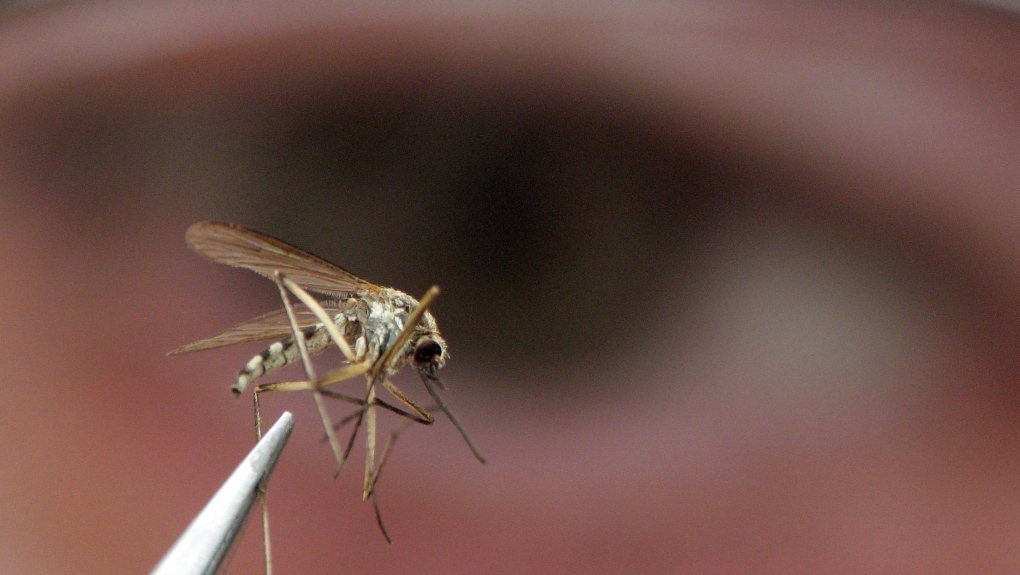Two more Lanark County horses test positive for eastern equine encephalitis virus
 An adult mosquito is shown in the laboratory as the 2007 West Nile Virus program of the Middlesex-London Health Unit kicked off in Strathroy, Ont., Thursday May 10, 2007. THE CANADIAN PRESS/Dave Chidley
An adult mosquito is shown in the laboratory as the 2007 West Nile Virus program of the Middlesex-London Health Unit kicked off in Strathroy, Ont., Thursday May 10, 2007. THE CANADIAN PRESS/Dave Chidley
The Leeds, Grenville and Lanark District Health Unit says two more horses in its region have tested positive for eastern equine encephalitis virus (EEEV).
The disease is typically found in birds but can spread via mosquitoes, similar to West Nile Virus.
Horses infected with EEEV cannot spread the disease to humans, but it signals that mosquitoes carrying the virus are present in the area. The mosquitoes that carry the virus are usually found close to flooded woodlands.
A horse in Lanark County tested positive for the virus last month, and a horse in Ottawa has also recently tested positive.
While a vaccine against EEEV exists for horses, there is none for humans; and so, the health unit is reminding everyone to take precautions against mosquito bites:
- Apply insect repellent containing DEET or icaridin, making sure to follow label directions;
- Wear light-coloured, loose-fitting, tightly-woven clothing with long sleeves, long pants and socks;
- Avoid being outside from dusk to dawn when mosquitoes are most active, and anytime in shady, wooded areas;
- Ensure that window and door screens are well fitting and without holes.
The U.S. Centers for Disease Control and Prevention says EEEV symptoms include fever, headache, vomiting, diarrhea, seizures, and drowsiness.
CTVNews.ca Top Stories

Aviation experts say Russia's air defence fire likely caused Azerbaijan plane crash as nation mourns
Aviation experts said Thursday that Russian air defence fire was likely responsible for the Azerbaijani plane crash the day before that killed 38 people and left all 29 survivors injured.
Police identify victim of Christmas Day homicide in Hintonburg, charge suspect
The Ottawa Police Service says the victim who had been killed on Christmas Day in Hintonburg has been identified.
Teen actor Hudson Meek, who appeared in 'Baby Driver,' dies after falling from moving vehicle
Hudson Meek, the 16-year-old actor who appeared in 'Baby Driver,' died last week after falling from a moving vehicle in Vestavia Hills, Alabama, according to CNN affiliate WVTM.
Pizza deliverer in Florida charged with stabbing pregnant woman at motel after tip dispute
A pizza deliverer in central Florida has been charged with pushing her way into a motel room with an accomplice and stabbing a pregnant woman after a dispute over a tip, authorities said.
Raised in Sask. after his family fled Hungary, this man spent decades spying on communists for the RCMP
As a Communist Party member in Calgary in the early 1940s, Frank Hadesbeck performed clerical work at the party office, printed leaflets and sold books.
Cat food that caused bird-flu death of Oregon pet was distributed in B.C.: officials
Pet food contaminated with bird flu – which killed a house cat in Oregon – was distributed and sold in British Columbia, according to officials south of the border.
Unwanted gift card in your stocking? Don't let it go to waste
Gift cards can be a quick and easy present for those who don't know what to buy and offer the recipient a chance to pick out something nice for themselves, but sometimes they can still miss the mark.
Sinkhole prompts lane closures on Interstate 80 in New Jersey
A sinkhole that opened up Thursday along Interstate 80 in northern New Jersey forced authorities to close the heavily travelled highway's eastbound lanes.
Boxing Day in Canada: Small retailers fear big shopping day won't make up for tough year
It’s one of the busiest shopping days of the year: Boxing Day sees thousands of people head to malls and big box stores to find great deals. But it's not so simple for smaller shops.
































